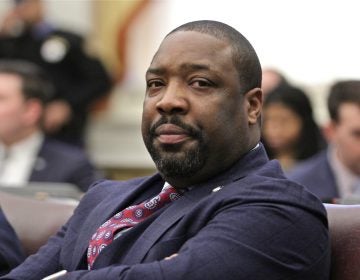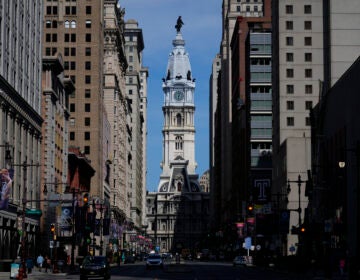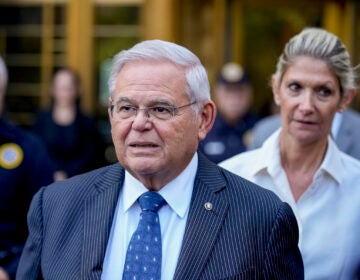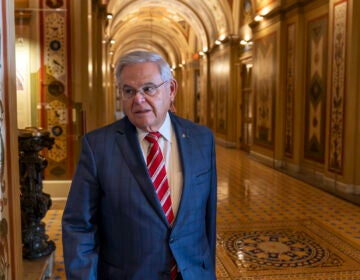Judge declares a mistrial in Philadelphia Councilmember Kenyatta Johnson trial
The verdict followed roughly three weeks of testimony in the federal trial. Johnson’s political future was at stake. Prosecutors say they will retry the case.
Listen 5:16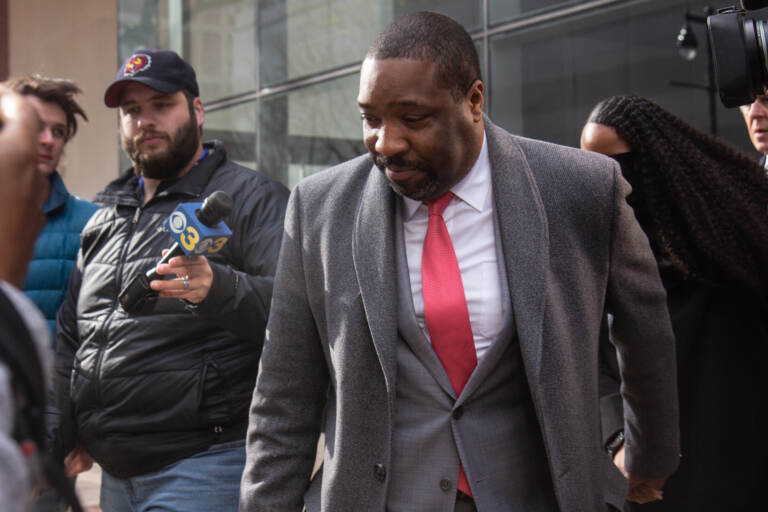
File photo: Philadelphia City Councilmember Kenyatta Johnson leaves federal court after the judge in his bribery trial declared a mistrial, following the jury's failure to reach a unanimous verdict, on April 19, 2022. (Kimberly Paynter/WHYY)
A judge on Tuesday declared a mistrial after the jury remained deadlocked in the federal bribery trial of Philadelphia City Councilmember Kenyatta Johnson. The decision comes a day after the panel indicated it was having trouble reaching a unanimous verdict.
The jury had spent roughly 25 hours deliberating before U.S. District Judge Gerald A. McHugh made the decision.
“You have failed to reach a verdict, but you have not failed. You came together as a jury. You did what we asked you to do, ” McHugh told jurors before dismissing them.
Johnson, 48, spoke briefly to a throng of reporters gathered outside the courthouse at 6th and Market Streets. “I just want to thank my Lord and savior Jesus Christ, I want to thank all of my family, friends and supporters for just praying for us and showing us support during this very stressful time,” he said.
Prosecutors declined to comment. The government intends to retry the case.
Tuesday’s outcome followed more than three weeks of testimony that threatened to end Johnson’s political career and send him and three co-defendants to prison. The trial was the second involving a sitting member of council within the past year. Last November, Councilmember Bobby Henon was convicted of bribery and conspiracy alongside powerful labor leader John “Johnny Doc” Dougherty. He resigned from Council in January.
The jury in Johnson’s case was asked to decide whether the case’s defendants had participated in a quid pro quo scheme between 2013 and 2014 that saw Johnson accept nearly $67,000 in bribes from Universal Companies in exchange for a pair of political favors involving valuable real estate the organization owned in Johnson’s legislative district.
Prosecutors argued that the bribe money was concealed as payments to a consulting firm led by Johnson’s wife and co-defendant Dawn Chavous. They said the 42-year-old did little work for the organization to prove otherwise. And that the work she did do for Universal was of low value or could have been performed by existing Universal staffers, including former Universal CEO Rahim Islam, her boss and co-defendant.
Former Universal CFO Shahied Dawan was also faced bribery charges.
“There was no evidence, in our view,” said Johnson’s lawyer, Patrick Egan. “Fortunately, some of the jurors obviously saw [it] that way as well.”
“Hopefully, at the end of the day, reason and justice will prevail, and this case will go away, as it should, without any convictions for my client or his spouse,” he added.
During 10 days of testimony, the government presented a torrent of emails and financial documents, while questioning nearly 20 witnesses. The list included current and former Universal employees, prominent Philadelphia developer Carl Dranoff and outgoing schools Superintendent William Hite.
None of the case’s four defendants took the witness stand.
Prosecutors spent most of their case trying to prove two things: That Chavous’ consulting contract with Universal was a charade in service of a bribery scheme. And that Universal and Johnson were both motivated by financial hardship.
Evidence showed that Universal had a 24-month stretch of losses, but never filed for bankruptcy. And that Chavous had considerable credit card debt while working for the nonprofit.
During a lengthy stint on the witness stand, FBI Special Agent Richard Haag, the case’s lead investigator, told jurors he calculated that Chavous did no more than 40 hours of work during her 16-month contract with Universal — a figure Assistant U.S. Attorney Mark Dubnoff made sure to repeat during his closing argument on Tuesday.
“That translates to an hourly rate of more than $1,660 an hour. Who pays that kind of money? Criminals. That’s who,” said Dubnoff.
According to the indictment, the bribe money prodded Johnson to introduce zoning legislation that enabled Universal to hold onto the Royal Theater on South Street, then a crumbling eyesore the company was in danger of losing as a result of a conservatorship petition filed in state court.
The bill, introduced less than a week after Chavous deposited her final check from Universal, rezoned the Royal, making it possible for the nonprofit to bring the mixed-use development it was planning to the site, but couldn’t without the ordinance. But less than two years after the legislation passed City Council, the organization sold the property for $3.7 million. It’s now home to apartments and a trendy restaurant.
Johnson also allegedly used councilmanic prerogative to stop the city from reclaiming vacant land Universal owned on the 1300 block of Bainbridge Street, a short walk from the Royal. This after the company, along with the Philadelphia Housing Authority, violated its 2005 agreement with the Redevelopment Authority, which required Universal to build housing on the parcels within two years of the agreement.
Brian Abernathy, then executive director of the authority, testified that Johnson told him over the phone that he didn’t support the city’s efforts to take back the land, creating a “chilling effect” that kept the land in Universal’s hands and left the city without the development it was promised.
Although he didn’t legally need Johnson’s approval, Abernathy said he didn’t want to cross him out of fear the councilmember wouldn’t support the agency if it tried to resell the land on Bainbridge to another developer. A council member must introduce a resolution for the city or the authority to finalize any sale of public land.
“If we reverted the property without the councilperson’s permission, we may have obtained the property and then not been able to convey it in the future,” said Abernathy, who is now a government affairs consultant.
Defense attorneys pushed back on all of it, mostly while cross-examining government witnesses.
They argued that Chavous’ contract with Universal was legitimate and that neither Johnson nor the nonprofit had any motivation, financial or otherwise, to participate in a bribery scheme.
Their reason: Johnson and Universal had a history of “mutual support” rooted in shared priorities. Namely, providing affordable housing and a good education to residents in South and Southwest Philadelphia.
At trial, Barry Gross, who represents Chavous, also spent considerable time reviewing emails and other documents that he believed showed his client was not a “low-show” consultant, but a workaholic who spent “hours and hours” helping Universal spread its story to wealthy individuals and well-heeled institutions with hopes of securing donations for the organization, which operates seven charter schools in Philadelphia.
The defense attorney said Chavous did research, attended and organized meetings and work dinners with elected officials and community leaders, as well as tours with charter school “enthusiasts.” She also logged hours planning a 20th anniversary celebration that never happened, he said.
“Your degree is not in organizational dynamics from Penn and you don’t have a certificate from Harvard in charter schools. But then you determined without interviewing a number of people…that this was little work, very little work, less than 40 hours,” Gross told Haag, who was on the stand for half of the government’s case.
Egan repeatedly challenged the government’s claims that his client and Chavous were in bad financial shape while the bribery scheme was unfolding.
As part of its case, the government reviewed the couple’s bank accounts and credit card statements. Prosecutors highlighted nearly two-dozen overdraft protection notices, Chavous’ credit card debt, and a $20,000 line of credit the couple obtained from TD Bank in 2015, after Chavous stopped working for Universal.
While questioning Haag, Egan noted that Johnson consistently had a significant amount of money in his personal bank accounts, while also staying current with nearly all of his credit card accounts. He also said Chavous started making additional mortgage payments during her time with Universal.
“From the time of March 2012 through the time of December 2014, there was never a point where the combined amount for his and her account was less than $20,000,” said Egan.
During his closing argument, David Laigaie, who represents Islam, reminded jurors that Universal paid consultants more than $600,000 in 2013 and more than $500,000 in 2014, totals he said didn’t square with a company in financial distress.
Prosecutors told the jurors that none of it mattered.
“Councilman Johnson sold his office for $66,750. Mrs. Chavous sold his office for $66,750. Mr. Islam and Mr. Dawan bought a councilman for $66,750,” said Dubnoff.
Islam and Dawan are due to sit for a second trial, where they face charges that they stole nearly $500,000 from Universal, including in the form of fraudulent bonuses.
The pair is also charged with bribing a school board president in Milwaukee while Universal was working to expand its charter school operation to the Cream City.
It’s now unclear when that trial will start in light of Tuesday’s mistrial and the need to seat a new jury. The panel that decided Johnson’s fate was expected to also sit for the second phase.
U.S. District Judge Gerald McHugh declares mistrial in federal jury trial of Philadelphia City Councilmember Kenyatta Johnson. @WHYYNews
— Aaron Moselle (@awmoselle) April 19, 2022
The mistrial followed more than three weeks of testimony. Johnson’s political future hinged on its outcome. The federal trial was the second involving a sitting member of council within the past year. Last November, Councilmember Bobby Henon was convicted of bribery and conspiracy alongside powerful labor leader John “Johnny Doc” Dougherty and forced to resign from council.
Johnson spoke briefly to reporters as he left the Federal Courthouse. “I just want to thank my Lord and savior Jesus Christ, I want to thank all of my family, friends and supporters for just praying for us and showing us support during this very stressful time,” Johnson said.
The jury in Johnson’s case was asked to find if the case’s four defendants had participated in a quid pro quo scheme that saw Johnson, 48, accept nearly $67,000 in what prosecutors called bribes from Universal in exchange for a pair of political favors involving valuable real estate the organization owned in Johnson’s legislative district.
Prosecutors argued that the bribe money was concealed as payments to Chavous’ consulting firm in 2013 and 2014. They said the 42-year-old did little work for the organization to prove otherwise. And that the work she did do for Universal was low value or could have been performed by existing Universal staffers, including Islam, her boss.
“There was no evidence, in our view,” said Johnson’s lawyer, Patrick Egan. “Fortunately, some of the jurors obviously saw [it] that way as well.” Egan repeated that his client did nothing wrong. “Hopefully, at the end of the day, reason and justice will prevail, and this case will go away, as it should, without any convictions for my client or his spouse,” he said.
None of the case’s four defendants took the witness stand.
During 10 days of testimony, the government presented a torrent of emails and financial documents, while questioning nearly 20 witnesses. The list included current and former Universal employees, prominent Philadelphia developer Carl Dranoff and outgoing schools Superintendent William Hite.
Prosecutors spent most of their case trying to prove two things: That Chavous’ consulting contract with Universal was a charade in service of a bribery scheme. And that Universal and Johnson were both motivated by financial hardship.
Evidence showed that Universal had a 24-month stretch of losses, but never filed for bankruptcy. And that Chavous had considerable credit card debt while working for the nonprofit.
During a lengthy stint on the witness stand, FBI Special Agent Richard Haag, the case’s lead investigator, told jurors he calculated that Chavous did no more than 40 hours of work during her 16-month contract with Universal — a figure Assistant U.S. Attorney Mark Dubnoff made sure to repeat during his closing argument on Tuesday.
“That translates to an hourly rate of more than $1,660 an hour. Who pays that kind of money? Criminals. That’s who,” said Dubnoff.
According to the indictment, the bribe money prodded Johnson to introduce zoning legislation that enabled Universal to hold onto the Royal Theater on South Street, then a crumbling eyesore the company was in danger of losing as a result of a conservatorship petition filed in state court.
The bill, introduced less than a week after Chavous deposited her final check from Universal, rezoned the Royal, making it possible for the nonprofit to bring the mixed-use development it was planning to the site, but couldn’t without the ordinance. But less than two years after the legislation passed City Council, the organization sold the property for $3.7 million. It’s now home to apartments and a trendy restaurant.
Johnson also allegedly used councilmanic prerogative to stop the city from reclaiming vacant land Universal owned on the 1300 block of Bainbridge Street, a short walk from the Royal. This after the company, along with the Philadelphia Housing Authority, violated its 2005 agreement with the Redevelopment Authority, which required Universal to build housing on the parcels within two years of the agreement.
Brian Abernathy, then executive director of the authority, testified that Johnson told him over the phone that he didn’t support the city’s efforts to take back the land, creating a “chilling effect” that kept the land in Universal’s hands and left the city without the development it was promised.
Although he didn’t legally need Johnson’s approval, Abernathy said he didn’t want to cross him out of fear the councilmember wouldn’t support the agency if it tried to resell the land on Bainbridge to another developer. A council member must introduce a resolution for the city or the authority to finalize any sale of public land.
“If we reverted the property without the councilperson’s permission, we may have obtained the property and then not been able to convey it in the future,” said Abernathy, who is now a government affairs consultant.
Defense attorneys pushed back on all of it, mostly while cross-examining government witnesses.
They argued that Chavous’ contract with Universal was legitimate and that neither Johnson nor the nonprofit had any motivation, financial or otherwise, to participate in a bribery scheme.
Their reason: Johnson and Universal had a history of “mutual support” rooted in shared priorities. Namely, providing affordable housing and a good education to residents in South and Southwest Philadelphia.
At trial, Barry Gross, who represents Chavous, also spent considerable time reviewing emails and other documents that he believed showed his client was not a “low-show” consultant, but a workaholic who spent “hours and hours” helping Universal spread its story to wealthy individuals and well-heeled institutions with hopes of securing donations for the organization, which operates seven charter schools in Philadelphia.
The defense attorney said Chavous did research, attended and organized meetings and work dinners with elected officials and community leaders, as well as tours with charter school “enthusiasts.” She also logged hours planning a 20th anniversary celebration that never happened, he said.
“Your degree is not in organizational dynamics from Penn and you don’t have a certificate from Harvard in charter schools. But then you determined without interviewing a number of people…that this was little work, very little work, less than 40 hours,” Gross told Haag, who was on the stand for half of the government’s case.
Johnson’s lawyer, Patrick Egan, repeatedly challenged the government’s claims that his client and Chavous were in bad financial shape while the bribery scheme was unfolding.
As part of its case, the government reviewed the couple’s bank accounts and credit card statements. Prosecutors highlighted nearly two-dozen overdraft protection notices, Chavous’ credit card debt, and a $20,000 line of credit the couple obtained from TD Bank in 2015, after Chavous stopped working for Universal.
While questioning Haag, Egan noted that Johnson consistently had a significant amount of money in his personal bank accounts, while also staying current with nearly all of his credit card accounts. He also said Chavous started making additional mortgage payments during her time with Universal.
“From the time of March 2012 through the time of December 2014, there was never a point where the combined amount for his and her account was less than $20,000,” said Egan.
During his closing argument, David Laigaie, who represents Islam, reminded jurors that Universal paid consultants more than $600,000 in 2013 and more than $500,000 in 2014, totals he said didn’t square with a company in financial distress.
Prosecutors told the jurors that none of it mattered.
“Councilman Johnson sold his office for $66,750. Mrs. Chavous sold his office for $66,750. Mr. Islam and Mr. Dawan bought a councilman for $66,750,” said Dubnoff.
Immediately following Johnson’s trial, Islam and Dawan will sit for a second trial, where they face charges that they stole nearly $500,000 from Universal, including fraudulent bonuses.
The pair is also charged with bribing a school board president in Milwaukee while Universal was working to expand its charter school operation to the Cream City.

Subscribe to PlanPhilly
WHYY is your source for fact-based, in-depth journalism and information. As a nonprofit organization, we rely on financial support from readers like you. Please give today.




